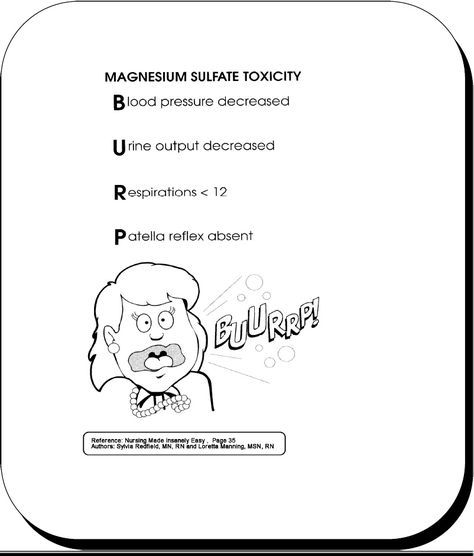A nurse on the postpartum unit is caring for four clients. For which of the following clients should the nurse notify the provider?
A client who reports luchia rubra requiring changing perineal pads every 3 hr
A client who has a urinary output of 300 mL in 8 hr
A client who is receiving magnesium sulphate and has absent deep tendon reflexes
A client who reports abdominal cramping during breastfeeding
The Correct Answer is C
A. A client who reports lochia rubra requiring changing perineal pads every 3 hr: Lochia rubra is the normal discharge during the early postpartum period. Changing perineal pads every 3 hours is within the expected range and does not warrant immediate notification of the provider.
B. A client who has a urinary output of 300 mL in 8 hr: Although the urinary output is relatively low, the information provided is not sufficient to conclude that this is abnormal. Further assessment is needed, and this finding alone may not be an emergency. However, it should be monitored.
C. A client who is receiving magnesium sulfate and has absent deep tendon reflexes: Absent deep tendon reflexes can be a sign of magnesium toxicity. Magnesium sulfate is used for various indications, such as preeclampsia or eclampsia, but it has a narrow therapeutic range. Absent deep tendon reflexes suggest the need for immediate attention and notification of the provider.

D. A client who reports abdominal cramping during breastfeeding: Abdominal cramping during breastfeeding is a common postpartum symptom associated with uterine contractions. It is a normal physiological response and does not require immediate notification of the provider.
Nursing Test Bank
Naxlex Comprehensive Predictor Exams
Related Questions
Correct Answer is D
Explanation
A. Administer 500 ml lactated Ringer's IV bolus:
This choice may be relevant in the context of postpartum hemorrhage, but the first step should be to assess the client's status, including urinary output. Administering fluids without a clear assessment may not address the underlying cause.
B. Replace the surgical dressing:
Vaginal bleeding after a cesarean birth is unlikely to be addressed by replacing the surgical dressing. This action may not address the root cause of the bleeding, which needs further assessment.
C. Apply an ice pack to the incision site:
Using an ice pack is not the appropriate intervention for postpartum bleeding. Ice is typically used for pain and swelling, not for controlling bleeding.
D. Evaluate urinary output:
This is the correct choice. Evaluating urinary output is crucial to assess the client's overall fluid status and kidney perfusion. In the context of postpartum bleeding, it helps determine if there is hypovolemia or other issues contributing to the bleeding. Adequate urinary output is a positive sign of organ perfusion.
Correct Answer is B
Explanation
A. Is your partner pressuring you to have sex?: While addressing issues of coercion or pressure in a relationship is important, this question may be more suited for a broader discussion about the client's overall well-being and relationships. It might be premature if the client is specifically seeking information about contraception.
B. What do you know about contraception?
This question aims to assess the adolescent's knowledge about contraception. Understanding the client's knowledge level is crucial for providing appropriate education and guidance on birth control options. It allows the nurse to tailor the information to the client's needs, address any misconceptions, and ensure informed decision-making regarding contraceptive choices
C. Why are you requesting a prescription for birth control?: This question may come across as judgmental or intrusive. It's important to approach the discussion in a non-judgmental and supportive manner. Focusing on the client's knowledge level allows for a more educational and collaborative conversation.
D. Are you sure your partner loves you?: This question delves into the emotional aspects of the client's relationship, which, while important, may not be directly relevant to the request for contraception. It's crucial to maintain a respectful and non-judgmental approach to avoid making the client feel uncomfortable.
Whether you are a student looking to ace your exams or a practicing nurse seeking to enhance your expertise , our nursing education contents will empower you with the confidence and competence to make a difference in the lives of patients and become a respected leader in the healthcare field.
Visit Naxlex, invest in your future and unlock endless possibilities with our unparalleled nursing education contents today
Report Wrong Answer on the Current Question
Do you disagree with the answer? If yes, what is your expected answer? Explain.
Kindly be descriptive with the issue you are facing.
